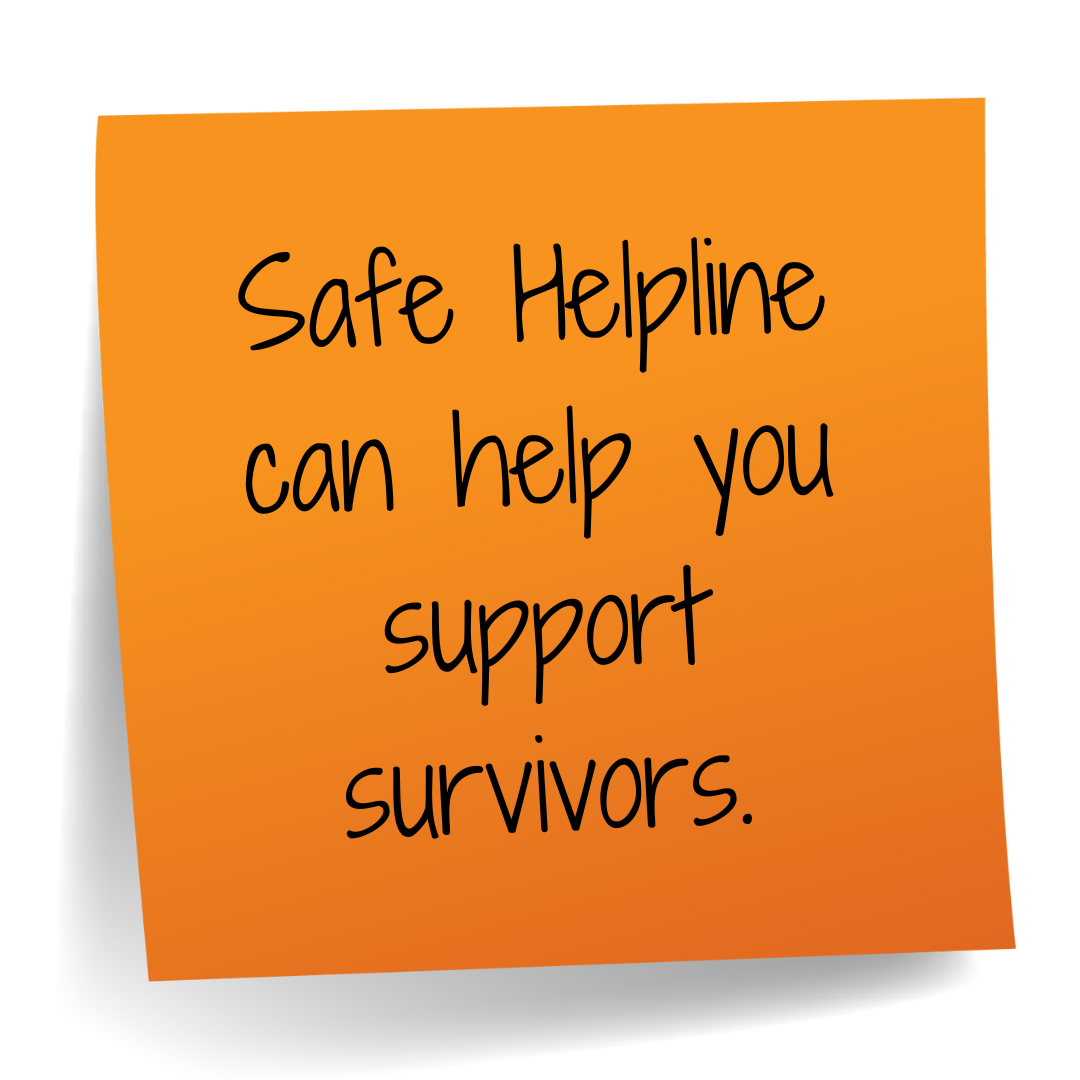 Sometimes, survivors are hesitant to share their experiences because they are not sure how others will react. It’s not always easy to know what to say when someone tells you they’ve been sexually assaulted, but an empathetic reaction can make all the difference.
Sometimes, survivors are hesitant to share their experiences because they are not sure how others will react. It’s not always easy to know what to say when someone tells you they’ve been sexually assaulted, but an empathetic reaction can make all the difference.
What can I say to help?
Survivors may want and need different types of support at different points in their healing journey. To learn more about some ways to support a survivor in your life, use the drop-down below.
Acknowledge that the experience has affected their life. Phrases such as “This must be really tough for you,” and, “I’m so glad you are sharing this with me,” help to communicate empathy.
Survivors may blame themselves, especially if they know the perpetrator personally, and may question their actions before, during and after the assault. Remind the survivor, as often as they need, that they are not to blame, regardless of any action they may or may not have taken. Self-blame is a common reaction for survivors. For more information on the effects of sexual assault, go here.
A survivor may feel ashamed or concerned that they won’t be believed. Leave any “why” questions or investigations to the experts—your job is to support this person. Be careful not to make assumptions based on the survivor's reactions—everyone responds differently.
Remind the survivor that you are there for them and willing to listen to their story. Remind them there are other people in their life who care and that there are service providers who will be able to support them as they recover from the experience.
The survivor might need medical attention, even if the event happened a while ago. You can support the survivor by offering to accompany them or find more information. It’s okay to ask directly, “Are you open to seeking medical care?” Remember to be respectful of the decisions they make.
You should never pressure a survivor into making a report. The decision to report should be entirely up to the survivor. If they choose to report, offering to accompany them can be of great help. You can learn more about reporting here.
It can take a great deal of trust for a survivor to disclose their assault. If they share their story with you, thank them for confiding in you and reassure them that you can be trusted and will respect their privacy. If a minor discloses a situation of sexual abuse, you are required in most situations to report the crime. Let the minor know that you have to tell another adult, and ask them if they’d like to be involved. Learn more about the laws in your state here.
For more helpful phrases, click here.
What can I do to help?
It can be extremely important in a survivor’s healing process that they have control over what happens next. They’ve taken the first step of sharing what happened to them with another person, and that takes a lot of courage. However, it’s always helpful to know how to help when they are ready for additional support. Here are some actionable ways you can help right now:
Healing from a sexual assault can’t begin until the survivor feels safe. If they’ve reached out to you, it probably means they trust you to support them and help them feel safe. Ask them what they need to help them feel physically and emotionally safe. For some people, this might be staying in a familiar place, like their home, but this isn’t the case for everyone, especially if their home is where the assault occurred. It is also important to check in on a survivor's emotional safety and help them think of healthy coping strategies. You can learn more about safety planning here or by talking with a Safe Helpline staff member.
Survivors are often reluctant to be alone after an assault. Accompany the survivor to the hospital or other places if they so desire, but be respectful of their wishes, even if you disagree.
Supporting a sexual assault survivor can take a toll on you as well. Become familiar with resources you can recommend to a survivor, like Safe Helpline or local resources like the base Sexual Assault Response Coordinator (SARC), and make sure you access resources to get the support you need as well, while being mindful not to compromise the victim’s confidentiality. You can access the Safe Helpline here, and look up local responders here.
When supporting a survivor of sexual assault, it is important to respect and value the boundaries they set. Not every survivor is comfortable speaking about their experience, and it is important to let them lead the conversation and make their own choices about their healing journey. If you are interested in learning more about setting and respecting boundaries, you can find information on Safe Helpline’s Boundaries and Healthy Relationships webpage.
What other resources should I know about?
Safe Helpline offers many useful resources to help you better understand sexual assault and better support a friend or family member who has experienced sexual assault. You can find some of these resources in the drop down below.
Safe Helpline’s How to Support a Survivor program provides in-depth information and concrete tools that can help friends, family, and other allies support the course of a survivor’s recovery. This program identifies helping behaviors that support survivors of sexual assault while also educating supporters about behaviors that can be harmful and how to avoid them.
Safe Helpline provides resources about how to get help from our services, information about the effects sexual assault can have on a survivor and ways you can respectively support their needs.
Good self-care enables you to better care for others, especially if there is someone in your life who has survived sexual violence. The DoD Safe Helpline app is a free resource complete with breathing exercises, journal prompts, and a coloring book for you to practice self-care.


